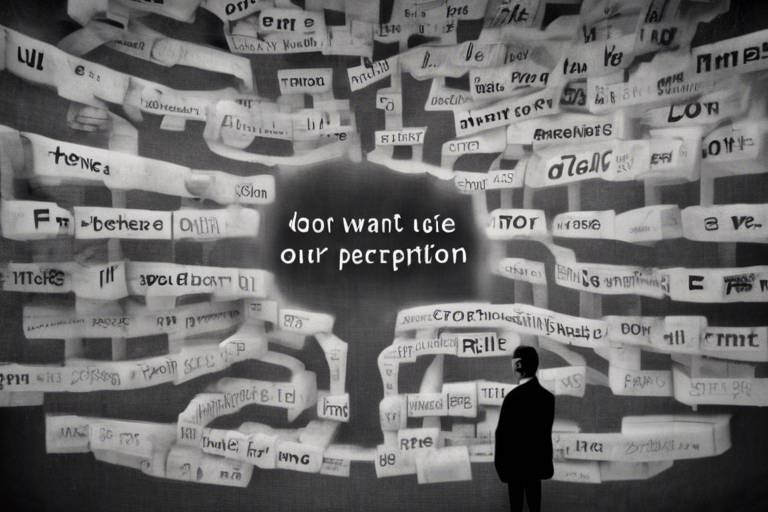How Ontology Shapes Our Self-Perception
Have you ever stopped to think about what makes you, *you*? The answer might be more complex than you think! At the core of our self-perception lies a fascinating philosophical concept known as ontology. This article dives into the intricate ways ontology influences how we see ourselves, shaping our identities and guiding our life choices. By exploring the foundations of ontology, we can uncover how our beliefs about existence and reality play a pivotal role in our self-concept. So, buckle up as we embark on this enlightening journey!
First things first, let’s break down the term ontology. In simple terms, ontology is the study of being and existence. It asks profound questions like: What does it mean to exist? What is the nature of reality? These questions have been pondered by philosophers for centuries, from Plato to Heidegger. Understanding ontology is crucial for grasping its influence on self-perception because it sets the stage for how we interpret our existence and the world around us.
In today’s world, ontology is not just a topic for philosophers; it’s relevant in various fields, including psychology, sociology, and even artificial intelligence. Our ontological beliefs can shape our attitudes, behaviors, and ultimately, our identities. So, how does this all connect to our self-perception? Let’s dive deeper!
Now, let’s explore how ontology contributes to the formation of our personal identity. Our ontological beliefs act as a lens through which we view ourselves and our place in the world. For instance, if you believe that people are inherently good, you might construct a self-concept that emphasizes kindness and empathy. Conversely, if you hold a more cynical view of humanity, your self-perception might lean towards skepticism or self-protection.
It’s fascinating to consider how these beliefs shape our identities. Here are a few ways ontological beliefs influence our self-concept:
- Self-Reflection: Engaging with ontological questions prompts us to reflect on our values and beliefs, leading to a more defined sense of self.
- Social Interactions: Our beliefs about existence influence how we interact with others, shaping our relationships and social identity.
- Life Choices: Ontological perspectives can guide our decisions, from career paths to personal relationships.
Language is a powerful tool that shapes our ontological perspectives. The words we use can significantly influence our understanding of ourselves and our reality. Have you ever noticed how certain phrases can evoke specific feelings or thoughts? For example, the term “self-care” conjures images of nurturing and well-being, while “self-indulgence” might suggest selfishness. This illustrates how language not only reflects our beliefs but also shapes our perceptions.
Let’s delve into the theory of linguistic relativity. This theory suggests that the structure of a language affects its speakers' worldview and cognition. In essence, the language you speak can shape how you think and perceive your identity. For instance, languages that have multiple words for “self” may encourage speakers to view their identities as more fluid and multifaceted, while languages with a singular term may promote a more static view of self.
Specific terms and labels can profoundly shape individual identity. Consider how labels like “introvert” or “extrovert” can influence how we see ourselves and how others perceive us. These terms carry connotations that can either empower or limit us. The way we describe ourselves can lead to a self-fulfilling prophecy, reinforcing our beliefs about who we are.
Cultural beliefs and values also play a significant role in shaping our ontological views. Each culture has its own set of beliefs about existence, which can influence how individuals perceive themselves. For example, in collectivist cultures, identity is often intertwined with family and community, whereas in individualistic cultures, personal achievement and independence are emphasized. Understanding these cultural ontologies can provide insight into the diverse ways people construct their identities.
Now, let’s explore the psychological implications of ontology. Our ontological beliefs can significantly affect our mental health and self-esteem. For instance, if someone believes that they are inherently flawed, this belief can lead to low self-esteem and negative self-perception. On the other hand, a more optimistic ontological perspective can foster resilience and a positive self-image.
Research suggests that the way we perceive our existence can lead to varying levels of self-esteem. Those with a strong sense of purpose and belonging often report higher self-worth. In contrast, individuals grappling with existential doubts may struggle with feelings of inadequacy. It’s essential to recognize how our beliefs about existence can shape our self-esteem and overall mental well-being.
Existential thoughts often arise from ontological considerations. Questions like “What is my purpose?” or “Why am I here?” can lead to profound insights or, conversely, existential dread. These thoughts can influence our self-perception and life choices, prompting us to seek meaning and fulfillment. Embracing these existential inquiries can lead to personal growth and a deeper understanding of ourselves.
Understanding ontology can have practical implications for personal development. By gaining insights into our ontological beliefs, we can enhance our self-awareness and foster personal growth. Here are a few ways to apply ontological insights:
- Self-Reflection: Regularly engage in self-reflection to explore your beliefs and values.
- Language Awareness: Pay attention to the language you use to describe yourself and others.
- Cultural Exploration: Learn about different cultural perspectives to broaden your understanding of identity.
1. What is ontology?
Ontology is the philosophical study of being and existence, exploring questions about what it means to exist and the nature of reality.
2. How does ontology affect self-perception?
Ontology influences how we view ourselves and our identities by shaping our beliefs about existence and reality.
3. Can language influence my self-perception?
Yes, the language we use can shape our understanding of ourselves and affect our self-concept.
4. How can I apply ontological insights to my life?
Engaging in self-reflection, being aware of the language you use, and exploring cultural perspectives can enhance your self-awareness and personal growth.

The Basics of Ontology
Understanding ontology is crucial for grasping its influence on self-perception. At its core, ontology is the philosophical study of the nature of being, existence, and reality. It delves into questions that might seem abstract at first glance, such as "What does it mean to exist?" and "What is the nature of reality?" These inquiries are not just for philosophers; they resonate deeply within each of us as we navigate our lives and form our identities.
The roots of ontology can be traced back to ancient philosophers like Aristotle, who laid the groundwork for understanding existence. He posed questions about the essence of objects and their properties, which still echo in contemporary discussions. In modern contexts, ontology has expanded beyond philosophy to influence disciplines such as linguistics, psychology, and even artificial intelligence. This cross-disciplinary relevance highlights how ontology shapes not only our understanding of the world but also our self-perception.
In today's fast-paced world, where information is constantly at our fingertips, the way we perceive ourselves is often tied to our ontological beliefs. For example, consider how social media platforms allow us to curate our identities. The choices we make about what to share and how to present ourselves are deeply influenced by our underlying beliefs about existence and reality. Are we merely projecting a version of ourselves, or are we genuinely expressing who we are? This tension reflects the dynamic interplay between ontology and identity.
Furthermore, ontology encourages us to reflect on our place within the larger tapestry of existence. It invites us to question not just who we are, but also what it means to be human. This exploration can lead to profound insights about our values, motivations, and aspirations. By engaging with ontological questions, we can foster a deeper understanding of ourselves and the world around us.
Ultimately, ontology is not just an abstract concept confined to academic discussions; it is a vital part of our everyday lives. As we navigate our personal journeys, understanding ontology can empower us to construct a more authentic self-concept, one that aligns with our true beliefs and values. In the subsequent sections, we will delve deeper into how ontology specifically influences identity formation, self-perception, and even our mental health.

When we think about who we are, we often dive deep into the murky waters of our identity. This is where ontology comes into play, acting as a guiding compass in the vast ocean of self-perception. At its core, ontology is the study of being—what it means to exist and how we categorize our understanding of reality. It’s fascinating to realize that our ontological beliefs can shape our identity in profound ways. For instance, if you see yourself as a creative person, that belief influences not just how you perceive your talents but also how you interact with the world around you.
Imagine your identity as a puzzle, with each piece representing different aspects of who you are. These pieces include your experiences, values, and beliefs, all of which are influenced by your ontological perspective. If you believe that people are inherently good, you might approach relationships with openness and trust. Conversely, if you see the world as a place filled with competition and mistrust, your interactions may be more guarded. This dynamic interplay between ontology and identity formation is crucial for understanding how we construct our self-concept.
Moreover, the relationship between ontological beliefs and self-concept can be illustrated through a few key factors:
- Self-Categorization: The way we categorize ourselves—be it as a student, parent, or artist—stem from our ontological views. These categories help us navigate our social world and define our roles within it.
- Personal Narratives: The stories we tell ourselves about our lives are deeply influenced by our ontological beliefs. These narratives shape our self-image and influence how we make sense of our past and future.
- Social Interaction: Our interactions with others can reinforce or challenge our ontological beliefs, further shaping our identity. For example, positive feedback from peers can bolster a sense of self-worth, while criticism may lead to self-doubt.
As we navigate through life, our ontological framework acts like a lens through which we view ourselves and our place in the world. It’s not just a theoretical concept; it’s a living, breathing part of our identity. The way we perceive ourselves can change over time, influenced by new experiences and insights. For instance, someone who once identified solely as a “worker” may shift their self-perception to include “adventurer” after embarking on a transformative journey. This evolution is a testament to the fluid nature of identity, shaped by our ongoing exploration of being.
In conclusion, ontology plays a critical role in identity formation. By understanding the relationship between our ontological beliefs and our self-concept, we can gain valuable insights into who we are and how we relate to the world. Embracing this understanding allows us to challenge limiting beliefs, redefine our identities, and ultimately, foster personal growth.
- What is ontology? Ontology is the philosophical study of the nature of being, existence, and reality.
- How does ontology affect identity? Our ontological beliefs shape how we perceive ourselves and influence our self-concept and interactions with others.
- Can ontological beliefs change over time? Yes, as we gain new experiences and insights, our ontological beliefs can evolve, leading to shifts in our identity.

Language is more than just a tool for communication; it is a powerful lens through which we view and interpret our reality. When we talk about ontology, we are essentially diving into the essence of being, and language plays a fundamental role in shaping our ontological perspectives. Have you ever considered how the words we use can influence our understanding of ourselves and the world around us? It’s fascinating to think that the very vocabulary we choose can create boundaries around our thoughts and beliefs.
At its core, ontology examines what it means to exist, and language serves as the framework for expressing these existential concepts. For instance, when we label ourselves using terms like “successful,” “creative,” or “introverted,” we are not just describing traits; we are actively constructing our identity. These linguistic choices can reinforce certain self-perceptions while simultaneously limiting others. It’s like wearing a pair of glasses that colors our view of the world—sometimes, we might not even realize we’re wearing them!
Moreover, the relationship between language and ontology is deeply intertwined with cultural contexts. Different cultures have unique linguistic structures that can shape how individuals perceive their existence. For example, in some languages, the distinction between the self and the community is blurred, leading to a more collective identity. In contrast, other languages emphasize individualism, which can foster a sense of separation from others. This cultural lens can significantly impact how people view themselves in relation to their surroundings.
To illustrate this point, let’s consider the concept of "self" in various languages:
| Language | Concept of Self |
|---|---|
| English | Individualistic; emphasizes personal identity |
| Japanese | Collectivistic; emphasizes harmony and group identity |
| Spanish | Balanced; values both individual and community |
This table highlights how different languages can influence the concept of self, showcasing the profound impact of linguistic frameworks on our ontological beliefs. The words we use not only describe our experiences but also shape our thoughts and feelings about who we are. It’s as if language acts as a sculptor, chiseling away at our self-perception and molding it into something tangible.
Furthermore, the theory of linguistic relativity suggests that the structure of a language affects its speakers' worldview. This means that the way we think is often dictated by the language we speak. If a language lacks terms for certain emotions or concepts, speakers may find it challenging to express those feelings, ultimately influencing their self-perception. For example, if a person speaks a language that doesn’t have a word for “anxiety,” they may struggle to articulate their feelings of unease, which could lead to a diminished understanding of their mental state.
In conclusion, the role of language in ontology is both complex and fascinating. It shapes our self-perception, influences our identity formation, and creates the framework through which we understand our existence. By becoming aware of the power of language, we can begin to recognize how our words shape our thoughts and beliefs. So, the next time you describe yourself or your experiences, take a moment to reflect on the language you use—because it might just be defining who you are.

The concept of linguistic relativity, often encapsulated in the phrase "the Sapir-Whorf hypothesis," posits that the language we speak not only reflects our thoughts but actually shapes them. Imagine for a moment that your language is like a pair of glasses through which you view the world. Each language offers a unique lens, altering the way you perceive reality and, consequently, yourself. This notion is particularly fascinating when we consider how the words we use can influence our self-perception in profound ways.
For instance, let's take a look at how different cultures describe emotions. In English, we have a broad range of words like "happy," "excited," and "content," but in some languages, these feelings might be expressed with a single term that encapsulates a more complex emotional state. This difference can lead speakers of those languages to experience and articulate their emotions differently, shaping their self-identity and how they relate to others.
Moreover, the structure of a language can also dictate the way we think about ourselves. In languages that emphasize the collective, such as many Asian languages, individuals might see themselves more as part of a community than as isolated entities. This communal perspective can influence self-esteem and personal identity, making individuals feel more connected but sometimes less autonomous. On the other hand, languages that focus on individualism, like English, often encourage a sense of self-reliance and personal achievement.
To illustrate this further, consider the following table that summarizes how different linguistic frameworks can affect self-perception:
| Language Type | Self-Perception Influence |
|---|---|
| Collectivist Languages | Emphasis on community and relationships; identity is often tied to group membership. |
| Individualist Languages | Focus on personal achievement and autonomy; identity is often centered on individual accomplishments. |
| Emotionally Rich Languages | Greater nuance in emotional expression; allows for a more detailed understanding of self and feelings. |
| Emotionally Sparse Languages | Limited vocabulary for emotions; may lead to a less nuanced self-concept. |
As we delve deeper into this topic, it becomes clear that our language not only serves as a tool for communication but also as a powerful influencer of our thoughts and identities. So, the next time you contemplate your self-perception, consider the language you use and how it shapes your understanding of who you are.
- What is linguistic relativity? Linguistic relativity is the idea that the structure and vocabulary of a language influence how its speakers think and perceive the world.
- How does language affect self-perception? Language can shape our thoughts and emotions, influencing how we view ourselves and our relationships with others.
- Can learning a new language change my self-identity? Yes, learning a new language can expose you to different cultural perspectives and ways of thinking, potentially altering your self-identity.

The words we choose to describe ourselves and others hold immense power. Terminology isn't just a collection of letters; it shapes our reality and influences how we perceive our identities. Think about it: when someone refers to themselves as a "survivor" versus a "victim," the implications are profound. The former implies strength and resilience, while the latter can evoke feelings of helplessness. This simple shift in terminology can significantly impact one’s self-image and how they navigate the world.
Language serves as a lens through which we view ourselves. Terminology can reinforce societal norms and stereotypes, which can either uplift or constrain our identities. For instance, terms like "disabled" or "differently-abled" can carry different connotations. The choice of words can empower individuals or perpetuate stigma, affecting how they see themselves and how society perceives them. This is especially important in discussions about marginalized groups, where language can either validate their experiences or diminish their identities.
Moreover, the impact of terminology extends beyond personal identity; it can shape collective identities as well. Consider the terms used in social movements—words like "freedom fighter" versus "terrorist" can polarize opinions and affect public perception. These labels can unify a group around a common cause or fragment communities based on differing interpretations of identity. It’s fascinating to see how language can mobilize people, ignite passions, and even spark revolutions.
In an age where social media amplifies voices, the terminology we use can spread rapidly, influencing public discourse and shaping cultural narratives. For example, the rise of terms like "cancel culture" or "woke" has sparked debates about accountability and social justice. These words carry weight and can transform conversations about identity, privilege, and oppression. Understanding the impact of terminology is crucial for fostering empathy and promoting constructive dialogue.
To illustrate the significance of terminology on identity, let's look at the following table that highlights different terms and their potential impacts:
| Term | Potential Impact on Identity |
|---|---|
| Survivor | Empowerment, resilience, strength |
| Victim | Helplessness, vulnerability, stigma |
| Differently-abled | Empowerment, inclusivity, respect |
| Disabled | Marginalization, stigma, limitation |
Ultimately, the impact of terminology on identity is a reminder of the importance of language in shaping our self-perception. By being mindful of the words we use, we can create a more inclusive and empowering environment for ourselves and others. It’s not just about what we say, but how we say it—and the profound effects it can have on our identities.
- How can terminology affect self-esteem?
Terminology can significantly influence self-esteem by framing how individuals view themselves. Positive terms can foster a sense of empowerment, while negative labels can lead to diminished self-worth. - Why is language important in identity formation?
Language is a fundamental tool for expressing identity. The words we use to describe ourselves can reinforce our beliefs and shape how we relate to the world around us. - Can changing terminology change perceptions?
Absolutely! Changing terminology can challenge stereotypes, promote understanding, and ultimately alter how individuals and groups are perceived by society.

Cultural ontologies are like the lenses through which we view the world and ourselves. Each culture has its own set of beliefs, values, and practices that shape how individuals perceive their identities. Imagine wearing a pair of glasses tinted by your cultural background; everything you see is influenced by those colors. This influence is profound, as it can dictate not only how we see ourselves but also how we interact with others and the world around us. For instance, in some cultures, community and family ties are paramount, leading individuals to define their identities in relation to their social groups. In contrast, other cultures may emphasize individualism, encouraging people to carve out their own unique identities independent of societal norms.
One way to understand this influence is by examining the different dimensions of cultural ontologies. These dimensions can include aspects such as collectivism versus individualism, power distance, and uncertainty avoidance. Each of these dimensions plays a critical role in shaping self-perception. For example, in collectivist cultures, a person's identity is often intertwined with their family or community, leading to a sense of belonging that can bolster self-esteem. Conversely, in individualistic cultures, the focus on personal achievement can foster a different kind of self-worth that is often tied to success and personal goals.
Moreover, cultural ontologies also manifest through language, rituals, and social norms. Language, as a cultural artifact, carries with it a wealth of meanings and implications that can shape thought processes. For instance, certain cultures may have specific terms that encapsulate concepts of honor, respect, or shame, which can significantly affect how individuals view themselves and their actions. This is where the connection between culture and ontology becomes even more intricate. The rituals and traditions that are passed down through generations serve to reinforce these cultural beliefs, further embedding them into the identities of individuals within that culture.
To illustrate the impact of cultural ontologies on self-perception, consider the following table that highlights various cultural dimensions and their potential effects on identity formation:
| Cultural Dimension | Effect on Identity |
|---|---|
| Collectivism | Identity is tied to family and community; self-worth is derived from group harmony. |
| Individualism | Emphasis on personal achievement; self-worth is based on individual success. |
| Power Distance | Acceptance of hierarchical structures; identity shaped by social status. |
| Uncertainty Avoidance | Preference for stability and predictability; identity influenced by adherence to norms. |
In summary, cultural ontologies are not just abstract concepts; they are deeply embedded in our daily lives and significantly influence our self-perception and identity formation. Understanding these influences can lead to greater self-awareness and appreciation of the diverse ways in which people construct their identities. By recognizing the cultural underpinnings of our beliefs, we can start to unravel the complexities of our self-concept and perhaps even challenge the narratives we've been taught to believe.

Have you ever wondered how our understanding of existence shapes our mental state? The intersection of ontology and psychology is a fascinating area that reveals how our beliefs about being and existence can profoundly influence our mental health and emotional well-being. At its core, ontology deals with the nature of being, while psychology explores the human mind and behavior. When these two fields converge, they offer unique insights into how our self-perception is crafted and maintained.
Ontological beliefs—those deep-seated convictions about what it means to exist—play a pivotal role in shaping our psychological landscape. For instance, if someone believes that they are inherently valuable and deserving of love, this belief can bolster their self-esteem and resilience in the face of challenges. On the flip side, a person who harbors ontological doubts about their worth may struggle with feelings of inadequacy and low self-esteem. This relationship between ontology and self-esteem is critical, as it can dictate how we navigate life's ups and downs.
Moreover, existential thoughts often bubble up from our ontological musings. Questions like "What is my purpose?" or "Why am I here?" can lead us down a path of introspection that influences our mental state. These existential inquiries can be both enlightening and overwhelming. They push us to confront our beliefs and the essence of our existence, which can either elevate our self-perception or plunge us into a crisis of identity.
To illustrate this connection, let's consider a few common ontological beliefs and their psychological implications:
| Ontological Belief | Psychological Impact |
|---|---|
| I am in control of my life. | Higher self-esteem and resilience. |
| I am unworthy of love. | Low self-esteem and feelings of isolation. |
| Life has inherent meaning. | Increased motivation and purpose. |
| Life is random and chaotic. | Anxiety and existential dread. |
This table highlights just a few examples of how our ontological beliefs can shape our psychological experiences. When we embrace empowering beliefs about our existence, we are more likely to cultivate a positive self-image and navigate life's challenges with confidence. Conversely, when we cling to limiting beliefs, we may find ourselves trapped in a cycle of negative self-perception.
Additionally, the therapeutic realm has begun to recognize the importance of addressing ontological beliefs in mental health treatment. Therapists often help clients unpack their beliefs about existence, guiding them toward more constructive perspectives that can enhance their well-being. This approach not only aids in improving self-esteem but also fosters a deeper understanding of one's identity and purpose.
In summary, the intersection of ontology and psychology serves as a powerful reminder of how our beliefs about existence shape our mental health. By examining and, if necessary, reshaping these beliefs, we can unlock new pathways to self-discovery and personal growth. In a world where self-perception can sometimes feel like a rollercoaster, understanding the roots of our beliefs can provide a stabilizing force that empowers us to embrace life with confidence and clarity.
- What is ontology? Ontology is the philosophical study of the nature of being, existence, and reality.
- How does ontology affect self-perception? Ontological beliefs influence how we view ourselves, our worth, and our purpose in life, impacting our overall mental health.
- Can therapy help with ontological beliefs? Yes, therapy can assist individuals in exploring and reshaping their ontological beliefs, leading to improved self-esteem and mental well-being.
- What role do existential questions play in psychology? Existential questions can prompt deep introspection and influence self-perception, often leading to either growth or anxiety.

Ontological beliefs are more than just abstract ideas; they are the very foundations upon which we build our understanding of ourselves and the world around us. These beliefs shape our perceptions and, in turn, have a profound impact on our self-esteem. When we think about ontology, we often overlook how deeply intertwined it is with our sense of self. For instance, if someone believes that they are inherently valuable and deserving of love, this belief can lead to a healthier self-esteem. On the other hand, if one harbors ontological beliefs that suggest they are unworthy or insignificant, it can lead to a diminished sense of self-worth.
Consider this: our ontological beliefs act like a lens through which we view our experiences. If that lens is tinted with positivity, we tend to interpret our achievements and failures in a more constructive light. Conversely, a negative lens can distort our self-image, making us overly critical of ourselves. This is particularly evident in how we react to feedback and criticism. A person with healthy ontological beliefs might see constructive criticism as an opportunity for growth, while someone with negative beliefs may perceive it as a personal attack, leading to further erosion of self-esteem.
Moreover, ontological beliefs can be influenced by various factors, including upbringing, cultural context, and personal experiences. For example, someone raised in an environment that emphasizes individual worth and potential may develop a strong sense of self-esteem, while another individual rooted in a culture that prioritizes collectivism may struggle with self-identity, feeling overshadowed by group expectations. This divergence illustrates how our beliefs about existence and our place in the world can either bolster or undermine our self-esteem.
To better understand the relationship between ontological beliefs and self-esteem, let’s examine some common ontological beliefs and their potential impacts:
| Ontological Belief | Impact on Self-Esteem |
|---|---|
| I am worthy of love and respect | Higher self-esteem, positive self-image |
| I must achieve to be valued | Conditional self-esteem, anxiety over performance |
| My worth is determined by others | Lower self-esteem, fear of rejection |
| I am capable of change and growth | Resilient self-esteem, openness to feedback |
As we can see from the table, the beliefs we hold about ourselves can significantly influence how we feel about our worth. It's essential to recognize that these beliefs are not set in stone; they can evolve. By engaging in self-reflection and challenging negative ontological beliefs, individuals can work towards fostering a more positive self-image. This journey often involves re-evaluating past experiences and reframing them in a way that acknowledges personal growth rather than failure.
In conclusion, ontological beliefs are a powerful force in shaping our self-esteem. By understanding and actively working on our beliefs about existence and self-worth, we can pave the way for a healthier, more positive self-perception. Remember, the journey to self-discovery is ongoing, and every step taken towards understanding your ontological beliefs can lead to a more fulfilling life.
- What are ontological beliefs? Ontological beliefs are fundamental ideas about existence that shape our understanding of ourselves and the world.
- How do ontological beliefs affect self-esteem? They influence how we perceive our worth and value, impacting our self-esteem positively or negatively.
- Can ontological beliefs change over time? Yes, through self-reflection and personal growth, individuals can alter their beliefs about themselves and their worth.
- What role does culture play in shaping ontological beliefs? Cultural context can significantly influence the beliefs we hold about ourselves, affecting our self-identity and self-esteem.

Existential thoughts are like the quiet whispers of our minds, nudging us to ponder the deeper meanings of our existence. They often arise from our ontological beliefs, prompting us to ask questions such as, "What is my purpose?" or "Why am I here?" These questions are not just idle musings; they can significantly influence our self-perception and the choices we make in life. When we engage with these existential queries, we embark on a journey of self-discovery that can either empower us or leave us feeling lost.
Imagine standing at a crossroads, with one path leading to a life filled with purpose and fulfillment, while the other drags you into a void of uncertainty and confusion. This metaphor illustrates how existential thoughts can shape our decisions. When we confront these thoughts, we often find ourselves reflecting on our values, beliefs, and the very essence of who we are. It's a bit like peeling an onion—each layer reveals more about our identity and our place in the world.
Moreover, existential thoughts can serve as a catalyst for personal growth. They challenge us to evaluate our current circumstances and push us to seek meaning beyond the surface. For instance, when faced with a significant life change, such as a career shift or a relationship ending, these thoughts can prompt us to reassess our goals and aspirations. We might ask ourselves questions like, "What truly makes me happy?" or "What legacy do I want to leave behind?" Such reflections can lead to profound transformations in how we view ourselves and our potential.
However, it's essential to recognize that not all existential thoughts are constructive. They can sometimes spiral into negative self-reflection, leading to anxiety and a sense of hopelessness. This is where the interplay between ontology and psychology becomes crucial. By understanding our ontological beliefs, we can navigate these existential thoughts more effectively. For example, if we believe that our worth is tied to our achievements, we may feel inadequate during times of failure. Conversely, recognizing our intrinsic value can foster resilience and a more positive self-image.
In light of this, fostering a healthy relationship with our existential thoughts is vital. Here are some strategies to consider:
- Journaling: Writing down your thoughts can help clarify your feelings and provide insight into your beliefs.
- Mindfulness: Practicing mindfulness can ground you in the present, allowing you to observe your thoughts without judgment.
- Engaging in Dialogue: Discussing your thoughts with trusted friends or mentors can provide new perspectives and support.
Ultimately, the role of existential thoughts in shaping our self-perception is profound. They invite us to explore the depths of our identity and encourage us to live authentically. By embracing these thoughts, rather than shying away from them, we can cultivate a richer, more meaningful understanding of ourselves and our place in the universe.
- What are existential thoughts?
Existential thoughts are deep reflections about our existence, purpose, and the nature of reality, often prompting questions about identity and meaning. - How do existential thoughts affect self-perception?
These thoughts can either empower us to seek greater meaning in life or lead to feelings of doubt and anxiety, depending on how we engage with them. - Can existential thoughts lead to personal growth?
Yes, by confronting and reflecting on these thoughts, we can gain insights that promote personal development and a clearer sense of purpose.

Understanding ontology isn't just an academic exercise; it has real-world implications that can significantly enhance our personal development. By grasping the nature of existence and our place within it, we can unlock a treasure trove of insights that empower us to live more fulfilling lives. Imagine standing at a crossroads, with each path representing a different way of seeing yourself and the world around you. Which path will you choose? The answer often lies in your ontological beliefs.
One of the most practical applications of ontological understanding is in the realm of self-awareness. When we take the time to reflect on our beliefs about existence, we begin to see how these beliefs shape our thoughts, emotions, and behaviors. For example, if you believe that your identity is fixed and unchangeable, you may find it challenging to adapt to new circumstances or embrace personal growth. However, if you adopt a more fluid perspective—seeing identity as something that evolves over time—you open yourself up to new possibilities and experiences. This shift in perception can lead to a more dynamic and resilient self-concept.
Moreover, ontological insights can greatly enhance our relationships. Understanding that everyone has their own unique perspective on existence can foster empathy and compassion. When we recognize that others may see the world through different ontological lenses, we can approach conflicts with a more open mind. This awareness encourages us to communicate more effectively, leading to healthier and more meaningful connections with others. Think of it as tuning into a radio station—when you adjust the dial to find the right frequency, suddenly the music becomes clearer and more enjoyable.
Another area where ontological understanding proves valuable is in decision-making. Our beliefs about existence often inform the choices we make in life. For instance, if you believe that you have control over your destiny, you are more likely to take proactive steps toward achieving your goals. Conversely, if you feel that your life is dictated by external forces, you may find yourself feeling powerless and stagnant. By consciously examining your ontological beliefs, you can empower yourself to make choices that align with your true values and aspirations.
In addition to personal growth, ontological understanding can also have a profound impact on mental health. Research has shown that individuals who possess a strong sense of purpose and meaning in their lives often experience lower levels of anxiety and depression. By exploring questions of existence and our role in the universe, we can cultivate a deeper sense of meaning that serves as a buffer against life's challenges. It's like having an emotional safety net—when the winds of adversity blow, your understanding of yourself and your place in the world can keep you grounded.
To summarize, the practical applications of ontological understanding are vast and varied. By embracing the insights gained from exploring our beliefs about existence, we can:
- Enhance our self-awareness and adaptability
- Foster empathy and improve relationships
- Make more informed and empowered decisions
- Cultivate a sense of purpose that supports mental well-being
Ultimately, ontology offers us a lens through which we can view ourselves and our lives more clearly. By applying these insights, we can navigate the complexities of existence with greater confidence and clarity, leading to a richer, more fulfilling life experience.
Q1: What is ontology?
A1: Ontology is the philosophical study of the nature of being, existence, and reality. It explores questions related to what entities exist and how they can be categorized and related to one another.
Q2: How can understanding ontology improve my self-perception?
A2: By examining your ontological beliefs, you can gain insights into how these beliefs shape your identity, thoughts, and behaviors. This self-awareness can lead to personal growth and improved relationships.
Q3: Can ontology help with mental health?
A3: Yes, understanding your beliefs about existence can foster a sense of purpose and meaning in life, which can serve as a protective factor against anxiety and depression.
Frequently Asked Questions
- What is ontology?
Ontology is a branch of philosophy that studies the nature of being, existence, and reality. It helps us understand how we categorize and relate to different aspects of our lives, influencing our self-perception and identity.
- How does ontology influence self-identity?
Ontology plays a crucial role in shaping our self-identity by providing a framework through which we interpret our experiences and beliefs. Our ontological views can dictate how we perceive ourselves and our place in the world, impacting our overall self-concept.
- What role does language play in ontology?
Language is a powerful tool that shapes our ontological perspectives. It influences how we express ourselves and understand reality. The words we use can frame our thoughts and beliefs, thus impacting our self-perception.
- Can you explain linguistic relativity?
Linguistic relativity is the theory that the structure of a language affects its speakers' world view or cognition. This means that the language we speak can shape our thoughts and perceptions, ultimately influencing how we see ourselves.
- How do cultural beliefs affect our identity?
Cultural beliefs and values significantly shape our ontological views. They provide a context for understanding ourselves and our identities, influencing how we perceive our roles and responsibilities within society.
- What are the psychological implications of ontology?
Ontology has profound psychological implications, especially regarding self-esteem and mental health. Our ontological beliefs can affect how we view ourselves, impacting our self-worth and overall psychological well-being.
- How can understanding ontology help with personal growth?
By understanding ontology, individuals can gain insights into their self-perception and identity. This awareness can lead to enhanced self-reflection, personal development, and a deeper understanding of one's place in the world.
- What existential questions arise from ontological beliefs?
Existential questions often stem from our ontological beliefs, such as "What is my purpose?" or "What is the meaning of life?" These questions can deeply influence our self-perception and the choices we make throughout life.



















